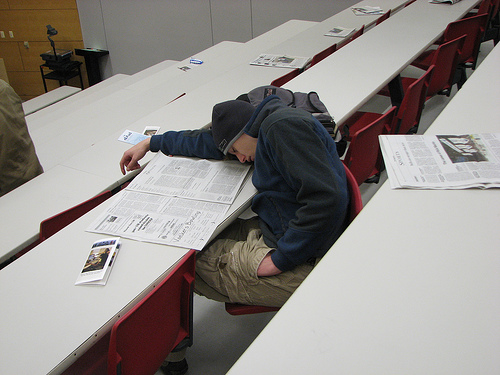More long-term students due to more stringent graduation requirements
Gepubliceerd: 16 April 2015 • Leestijd: 1 minuten en 8 seconden • English Dit artikel is meer dan een jaar oud.The number of long-term students in higher education, as well as in the Rotterdam University of Applied Sciences, is increasing. This is partly due to the more stringent graduation requirements. This week, executive board chairman Ron Bormans expressed his concern.

Bormans responded to the question asked by Selcuk Durak in the meeting of the central representative advisory board earlier this week, which concerned the performance agreements made between the Rotterdam University of Applied Sciences and Ms. Bussemaker, Dutch State Secretary. The results are a problem, as is the case in more institutes for higher education. ‘A group of students are having trouble graduating,’ said executive board chairman Bormans. ‘And that is partly due to the more stringent graduation requirements.’
Recovery period
These requirements are the result of the fact that accreditation organization NVAO has decided to look at the quality of the graduation projects of students with increasingly more meticulousness; the so-called standard 3. If, according to the NVAO, a college of higher education doesn’t have sufficient grip on it, a study program is not accredited, and what follows is a recovery period. In the Rotterdam University of Applied Sciences, this was the case with leisure management, for example; on his blog, Bormans writes about the dilemmas occurring during such an accreditation process.
The institutes with the most long-term students are IFM (financial management), RBS (Rotterdam Business School), IBK (Institute for Business Administration), and IvL (Teacher Training College). Bormans: ‘We’ve made agreements with the directors of these institutes entailing that additional guidance will be provided – in other words: that something has to be done about it. This is not always going smoothly, and I believe that representative advisory boards of institutes should focus particular attention on that.’
According to Bormans, Ms. Bussemaker, Dutch Secretary of State, is understanding about the situation.
Jos van Nierop






Laat een reactie achter
Spelregels
De redactie waardeert het als je onder je eigen naam reageert.
Lees hier alle details over onze spelregels.
Aanbevolen door de redactie
Docenten starten petitie: HR moet zich uitspreken tegen schending mensenrechten in Gaza
Vervroegde renovatie Museumpark gaat zorgen voor ingrijpend verhuiscircus
Ondernemende Ad-student Joyce start op HR pilot met gratis menstruatieproducten
Back to Top